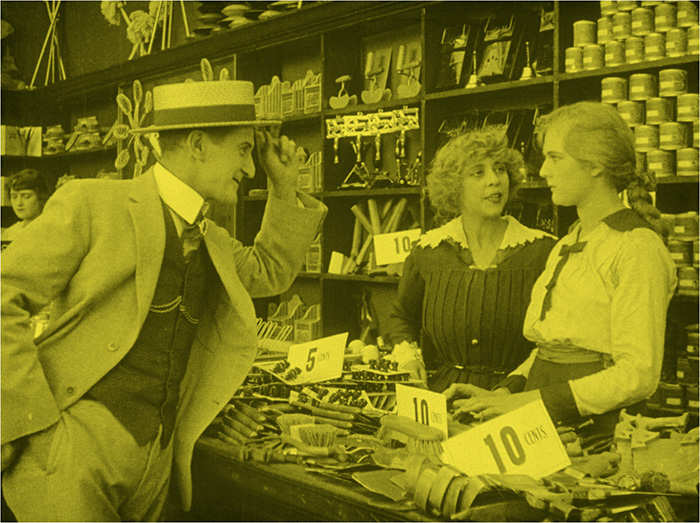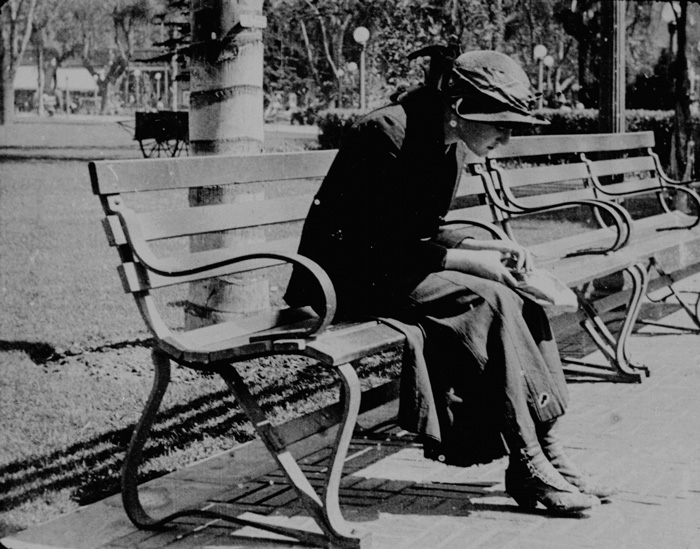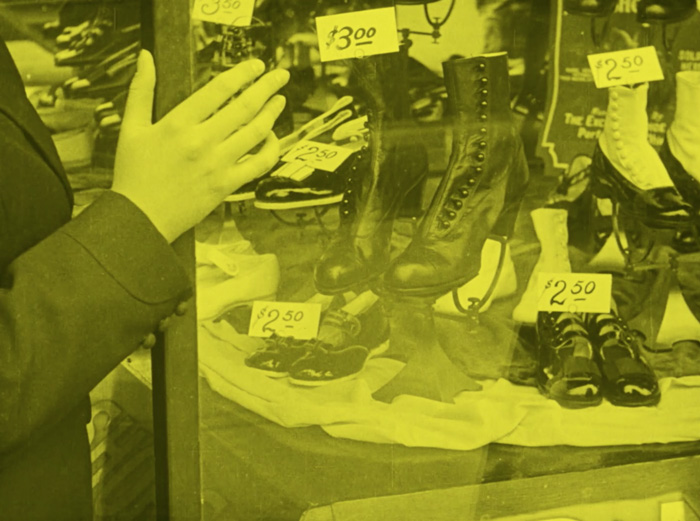USA 1916 | Director, Script: Lois Weber | Camera: Stephen S. Norton, King D. Gray, Al Siegler | Cast: Mary MacLaren, Harry Griffith, Mattie Witting, Jessie Arnold, William Mong, Lina Basquette | Production: Lois Weber, Phillips Smalley, Bluebird Photoplays Inc. | b/w | DCP of 35mm, restored version | 57 min | silent | amer. INT + german SUB | EYE Filmmuseum Amsterdam
With SHOES Weber tackled one of the Progressive Era’s most pronounced social phenomena – the influx of young, single women into the paid labor force. Weber’s interest in the fate of underpaid retail clerks echoed many sociological studies of the era that investigated the “problem” of young female wage earners, often raising questions about desires unleashed by commercial recreation culture and the consumer economy, particularly in the context of urban communities where young women lived and worked, often outside the immediate supervision of their families. “Shopgirls,” such as the heroine in SHOES, were privileged in these studies, for their labor bridged the industrial and commercial spheres. […]. While reinforcing much of the cautionary tenor of reform tracts SHOES also allowed its targeted middle-class viewers (women in particular) access to the aspirations and longings of the “working girls” under scrutiny. Thus, rather than simply reflecting the preoccupations of current reformers, Shoes actually demonstrates cinema’s distinctive role in Progressive debates, its intertext producing a complex conversation about the role cinema might play in Progressive society.
The film focuses on Eva Meyer (Mary MacLaren), a five-and-dime store clerk whose meager five-dollar-a-week salary must support her mother and father, along with three younger sisters, supplemented only by the limited income her mother (Mae Witting) earns by taking in laundry. Her father (Harry Griffith) is unable, and the film suggests, unwilling, to find work to support his family, so his eldest daughter must shoulder their financial burden alone. Standing on her feet all day at the store, Eva quickly wears out the soles of her boots, and though she begs her mother for money to buy a new pair she has spotted in a display window, Mrs. Meyer cannot spare the extra money from an already-strained family budget. After catching cold walking in the rain with her deteriorating footwear, and again being refused money to purchase new shoes, Eva finally accepts an invitation from a persistent male flatterer who has pursued her at work, agreeing to meet him one evening at a cabaret. […]
[…] in SHOES, viewers are invited to share the psychological interiority of a working-class retail clerk, and at other moments they are asked to step beyond her personal experience to observe the wider social and economic arena in which she operates. With SHOES Weber is addressing viewers she believes can become active agents of change in Progressive society. (Shelly Stamp)
The Music
It's interesting to know that Lois Weber was a very well-trained professional concert pianist before she became a film director. Her past was reflected in her films; their characteristic timing and spatial construction are more musical than others of the time, and it seems almost natural to compose for them.
Despite such genuine musicality, there are problems to solve: the film is presented as a "drama" but at the same time has a strong documentary touch. This is connected with the question of how to portray poverty: as a viewer from the outside, or from the inside out? As I see it, Lois Weber went both ways at the same time. In the course of the film, she continually switches perspectives, sensitively and inventively. This switching became the starting point for my composition. Lois Weber describes it herself: "A slight rippling on the surface. Whatever happened, life must go on. Whatever boats are wrecked, the river does not stop flowing to the sea." – In the music, I try to create this slight rippling in all possible shapes and forms, the upper layer of a long musical river drifting towards its end. (Maud Nelissen)
The Composer
Maud Nelissen from the Netherlands is one of the most important international silent film pianists and composers. She has performed in Europe, the USA and Asia, and regularly plays at the festivals Il Cinema Ritrovato in Bologna and Le Giornate del Cinema Muto in Pordenone. Her collaboration with Kinothek Asta Nielsen began in 2002; her composition projects have been realised several times in cooperation with ZDF/arte, which also broadcast them. Nelissen is the founder of the silent film orchestra The Sprockets.
The Soloists
Maud Nelissen, composition and piano
Daphne Balvers, soprano and alto saxophone
Timora Rosler, Cello



| Acronyms | |
|---|---|
| amer. | American English |
| b/w | Black and white |
| OV | Original version |
| SUB | Subtitles |
| +SUB | electronic live subtitling (below the image) |
| INT | Intertitles |
| Countries | |
|---|---|
| AT | Austria |
| FRG | Federal Republic of Germany (historic) |
| BLR | Belarus |
| DE | Germany |
| CAN | Canada |
| GDR | German Democratic Republic (historic) |
| EGY | Egypt |
| FR | France |
| GB | Great Britain |
| URY | Uruguay |
| BRA | Brasil |
| SWE | Sweden |
| UKR | Ukraine |
| PL | Poland |
| IDN | Indonesia |
| PRT | Portugal |
| HRV | Croatia |
| ECU | Ecuador |
| HUN | Hungary |
| AUS | Australia |
| IT | Italy |
| MEX | Mexico |
| IND | India |






